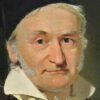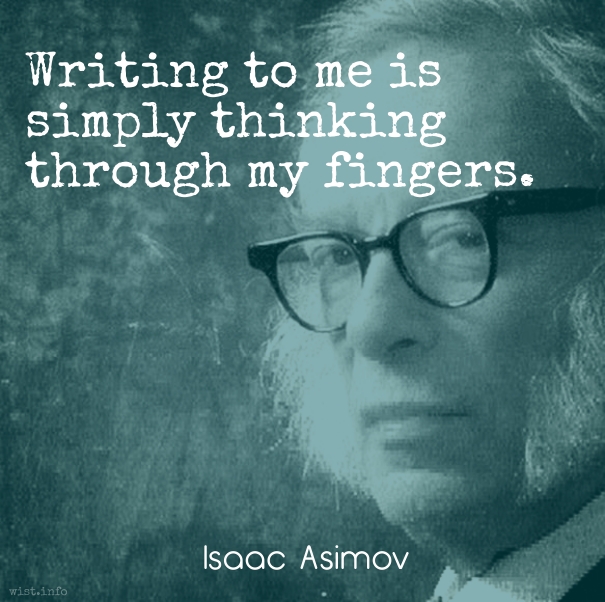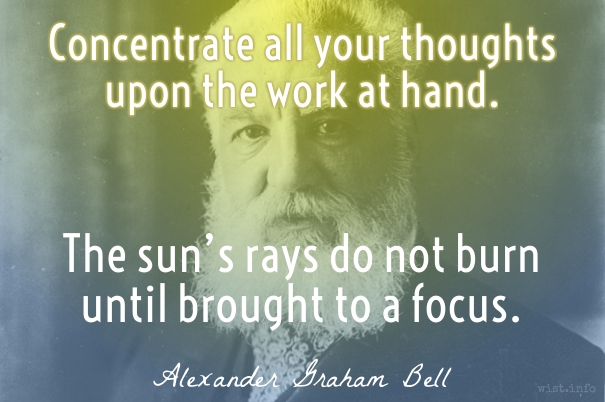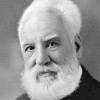Sex gives us a glimpse of a concentration of the mind that would make us godlike if we could command it in other spheres.
Colin Wilson (1931-2013) English existentialist philosopher, novelist
The God of the Labyrinth [The Hedonists] (1970)
(Source)
Quotations about:
concentration
Note not all quotations have been tagged, so Search may find additional quotes on this topic.
The concentration of a small child at play is analogous to the concentration of the artist of any discipline. In real play, which is real concentration, the child is not only outside time, he is outside himself. He has thrown himself completely into whatever it is that he is doing. A child playing a game, building a sand castle, painting a picture, is completely in what he is doing. His self-consciousness is gone; his consciousness is wholly focused outside himself.
Anyone who has achieved excellence in any form knows that it comes as a result of ceaseless concentration. Paying attention.
Louise "Lulu" Brooks (1906-1985) American film actress, dancer, writer
Lulu in Hollywood, ch. 5 “The Other Face of W. C. Fields” (1982)
(Source)
Writing of Mack Sennett.
If I wanted to write, I had to be willing to develop a kind of concentration found mostly in people awaiting execution.
You know that I write slowly. This is chiefly because I am never satisfied until I have said as much as possible in a few words, and writing briefly takes far more time than writing at length.
[Sie wissen, dass ich langsam schreibe, allein dies kommt hauptsächlich daher, weil ich mir nie anders gefallen kann, als wenn in kleinem Raum möglichst viel ist, und kurz zu schreiben viel mehr Zeit kostet als lang.]
Carl Friedrich Gauss (1777-1855) German mathematician, geodesist, physicist [Carolus Fridericus Gauss]
Letter to Heinrich Christian Schumacher (1833-04-02)
The letter, in German, can be found in Christian August Friedrich Peters (ed.), Briefwechsel zwischen C. F. Gauss und H. C. Schumacher, Vol. 2 (1860).
The English translation source for this quotation is obscure. It is quoted, without citation, in H. Merschkowski, Ways of Thought of Great Mathematicians (1964) and, more recently, G. Simmons, Calculus Gems (1992), and is usually referenced to one of those two books.
No education is worth having that does not teach the lesson of concentration on a task, however unattractive. These lessons, if not learnt early, will be learnt, if at all, with pain and grief in later life.
Cyril Connolly (1903-1974) English intellectual, literary critic and writer.
Enemies of Promise, Part 3, ch. 24 “Vale” (1938)
(Source)
Speaking as a personified Eton College, quoting one of the masters there.
I feel more alive when I’m writing than I do at any other time — except when I’m making love. Two things when you forget time, when nothing exists except the moment — the moment of the writing, the moment of love. That perfect concentration is bliss.
Concentration is the secret of strength in politics, in war, in trade, in short, in all management of human affairs.
Ralph Waldo Emerson (1803-1882) American essayist, lecturer, poet
“Power,” The Conduct of Life, ch. 2 (1860)
(Source)
A talent forms itself in solitude,
A character amid the stream of life.[Es bildet ein Talent sich in der Stille,
Sich ein Charakter in dem Strom der Welt.]Johann Wolfgang von Goethe (1749-1832) German poet, statesman, scientist
Torquato Tasso, Act 1, sc. 2, ll. 304-305 [Leonora] (1790) [tr. Ryder (1993)]
(Source)
(Source (German)). Alternate translations:
- "A talent doth in stillness form itself -- / A character on life's unquiet stream." [tr. Des Voeux (1827)]
- "Talents are nurtured best in solitude, -- / A character on life's tempestuous sea." [tr. Swanwick (1843)]
- "Man's talent ripens in tranquility, / His character in battling with the world." [tr. Cartwright (1861)]
- "A talent in tranquility is formed, / A character in the turbulence of affairs." [tr. Hamburger (20th C)]
- "Talent develops in quiet places, / Character in the full current of human life."
- Talents are best nurtured in solitude; / Character is best formed in the stormy billows of the world.
- "Genius is formed in quiet, / Character in the stream of human life."
Thinking is the activity I love best, and writing to me is simply thinking through my fingers. I can write up to 18 hours a day. Typing 90 words a minute, I’ve done better than 50 pages a day. Nothing interferes with my concentration. You could put an orgy in my office and I wouldn’t look up — well, maybe once or twice.
Concentrate all your thoughts upon the work at hand. The sun’s rays do not burn until brought to a focus.
Alexander Graham Bell (1847-1922) Scottish-American scientist, inventor, engineer
Interview, in Orison Swett Marden, How They Succeeded, ch. 2 (1901)
(Source)
The most successful men in the end are those whose success is the result of steady accretion. That intellectuality is more vigorous that has attained its strength gradually. It is the man who carefully advances step by step, with his mind becoming wider and wider — and progressively better able to grasp any theme or situation — persevering in what he knows to be practical, and concentrating his thought upon it, who is bound to succeed in the greatest degree.
Alexander Graham Bell (1847-1922) Scottish-American scientist, inventor, engineer
Interview, in Orison Swett Marden, How They Succeeded, ch. 2 (1901)
(Source)
Many irons on the Fire, some must cool.
(Other Authors and Sources)
Scottish Proverb
(Source)
In James Kelly, A Complete Collection of Scottish Proverbs, M.93 (1721)
Depend upon it, Sir, when a man knows he is to be hanged in a fortnight, it concentrates his mind wonderfully.
Samuel Johnson (1709-1784) English writer, lexicographer, critic
Comment (1777-09-19)
(Source)
In James Boswell, The Life of Samuel Johnson (1791)
















